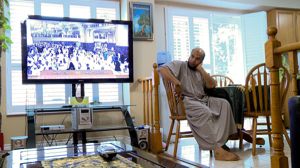I saw you once, but I doubt you saw me in the sea of faces at Parliament Hill in late 2004. I was one of the fifteen thousand who came out to protest George W. Bush's visit to Canada and I got to hear you tell your story first-hand. From a podium under the Peace Tower, you spoke of your husband Mohamed Harkat, and how he had been incarcerated since December 2002 without any charges laid against him. I distinctly remember you telling us how much you loved him, and that he was 'really cute'. I smiled and thought of my husband and quite selfishly realized how lucky I was not to be in your position.
Watching the documentary, The Secret Trial 5, about the detention of your husband and four other men (Adil Charkaoui, Hassan Almrei, Mahmoud Jaballah, and Mohammed Mahjoub) on suspicions of terrorism, I was disturbed by and ashamed of my government's actions. It's difficult to reconcile their Draconian measures with the just and fair Canada I was raised to believe in, and this is precisely the response The Secret Trial 5 seeks to elicit.
It must have taken an enormous leap of faith for yourself, Mohamed, and the other men and their families, to trust that your stories would be told without hyperbole by director Amar Wala. With the exception of Mahjoub, you all shared the horror, uncertainty and despair of dealing with the complete upheaval of your existence and your future. That five men living quiet lives can be arrested without cause or warning should be the stuff of dystopian fiction, and the question I asked myself was, "how can this happen in Canada?"
The answer is 'security certificates', an immigration measure whose validity is the central focus of the documentary. I'm sure you could explain security certificates in your sleep by now, but thankfully the doc uses animation to define it for those of us fortunate enough to have less familiarity. Simply put, a security certificate is a piece of immigration legislation that only non-Canadians are subject to, which is a means of doing national security law without using the criminal justice system. This starts with CSIS developing a file on someone they consider suspicious enough to jeopardize Canadian security. This file is brought before the Minister of Citizenship and Immigration and the Minister of Public Safety who, if they deem the suspicions are warranted, put the file before a federal judge. The judge decides if the suspicions about this person are 'reasonable' or 'not reasonable' with the goal being deportation for those deemed a 'reasonable' risk to Canadian security. Meanwhile, those under suspicion have no idea this is happening. Until they are arrested.
I can't even begin to imagine how you explained your husband's situation to your family and friends. Because the five men feared torture in their birth countries should they be deported, they were incarcerated in Canadian prisons instead. Since none of the men were ever formally charged with a crime, they were not subject to the same privileges as other prisoners. Even more frustrating is the fact that the men (and their lawyers) were forbidden from seeing the evidence against them, making it nearly impossible to defend themselves. How do you deal with the prospect of your husband simply rotting in jail with no end in sight? Hassan Almrei staged several hunger strikes, the longest lasting 156 days to protest the conditions of his freezing cell. He was awarded a pair of slippers. When the men were moved to a hastily constructed detention centre in Kingston dubbed 'Guantanamo North', how did you reconcile their treatment by the country in which you were born and raised? You did what any loving wife would do, you fought back.
You and the other families shared resources, staged protests, and grew a network of experts and concerned citizens to assist in proving that security certificates were unconstitutional. By the time the men were released into house arrest in 2007 they had spent a combined 50 years behind bars without ever being charged with a crime. Ahmad Jaballah, was a child when his father Mahmoud was arrested and is now a father himself. He dedicated his life to fighting for justice for The Five and tells us, "our strength is in our humanity".
Most Canadians were aware of these suspected terrorists being detained, ostensibly to protect our security. But Wala refreshes our memory using print and tv news footage that shows how our collective attitudes towards the detainees changed since the peak of our anxiety immediately following September 11, 2001. Juxtaposed against the stories you tell us of the hell that is house arrest (conditions too ludicrous and numerous to name here); it's an embarrassing reminder of the measures a frightened society will abide in the name of public safety. Wala aims to show us that the opposite is true; when a government can circumvent the criminal justice system in the name of national security, it puts all of our liberties at risk.
Like the The Central Park Five, The Paradise Lost _trilogy, and _TheThin Blue Line before it, The Secret Trial 5 _doesn't need to rely on gimmickry or sentimentality to present its case. And like those other films, once the facts are presented in the court of public opinion, a welcome by-product may indeed be exoneration since of the five men, three are still fighting to clear their names, your husband among them. _The Secret Trial 5 presents us with an uncomfortable reality; that maybe this isn't the country we thought it was. This should make a society long mocked for its politeness very angry. Because as you well know, angry people get things done.
With much respect and admiration,
Di







